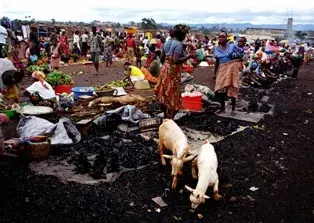Research
The Copenhagen Consensus Expert Panel's deliberations were informed by ten new research papers commissioned for the project from top scholars from around the world. Each paper rigorously examined different approaches to tackling one global challenge.
Conflicts
Although wars between nations have become less common in recent decades, the frequency of civil wars around the world has increased. These two types of conflict cannot sensibly be analysed together. This paper focuses entirely on reducing the incidence of civil wars. Since the post-conflict period actually presents particularly high risks, the biggest opportunity lies in preventing wars from recurring.
Within the challenge of reducing the global incidence of civil war, this paper focuses on three opportunities. These are the prevention of civil war in currently peaceful environments; the shortening of conflicts in currently war-torn environments; and the reduction in the risk of the resumption of conflict in postconflict situations. These opportunities are very different, both in terms of instruments and pay-offs. Probably the highest pay-off is from improved interventions in post-conflict situations. Post-conflict relapses into renewed violence account for around half of all global civil wars, and so they provide an opportunity for highly focused interventions. By contrast, prevention is a highly diffuse approach.

Climate Change
The Challenge Paper prepared for CC04 examines the issue area of abatement of greenhouse gas emissions to limit future damage from global warming. Three policy strategies are evaluated: a) an optimal, globally-coordinated carbon tax; b) the Kyoto Protocol; and c) a value-at-risk strategy setting carbon taxes to limit exposure to high damage.
First, however, a considerable portion of this paper must be devoted to the conceptual framework and key assumptions used in modeling costs and benefits from abatement of global warming.
The paper briefly reviews the state of play in the scientific and international policy deliberations on global warming. It summarizes the key findings of the 2001 review of the Intergovernmental Panel on Climate Change (IPCC) and reviews the status of the Kyoto Protocol. It also discusses crucial methodological components that can drive sharply contrasting results in cost-benefit analyses of global warming abatement, including especially the question of appropriate time discounting for issues with century-scale time horizons.

Communicable Diseases
Over the second half of the twentieth century, the world has seen enormous health improvements. However, developing countries have benefited unequally from health gains, with many, especially in sub-Saharan Africa, continuing to experience high mortality.
Children bear a major burden of ill health, with infectious and parasitic diseases the main killers. Adults experience substantial premature mortality. Within countries, poorer groups have considerably worse health than the better off. Analysis of avoidable mortality highlights the importance of communicable disease, which represents around 90% of all avoidable mortality in almost all age/sex groups. The
benefits of research mean that tools and approaches now exist to address the great majority of the burden of communicable disease, most notably malaria, TB, and HIV/AIDS, as well as vaccine preventable diseases. However, large numbers of people do not have effective access to prevention and treatment, and as a result die.
The challenge paper focuses on three opportunities:
- Malaria control
- HIV/AIDS control
- Strengthening basic health services.
This categorisation has been chosen largely because malaria and HIV/AIDS are major causes of disease burden and economic losses; cost-effective interventions are known to exist for their control; there is recent literature which can be drawn on to estimate costs and benefits; and these diseases are currently the focus of world attention. Basic health services have been chosen as the third opportunity since they address a major part of the disease burden, and represent explicitly the infrastructure that needs to be in place for people’s main health needs to be met.

Education
“Lack of education” as a global challenge must be understood, at an individual level, as a failure to master the many distinct competencies necessary to thrive in a modern economy and society. Remedying this is not simply a question of providing more schools, more teaching aids or reducing drop-out rates.
The challenge is to create competencies and learning achievement rather than just educational tools. Because it is easy to measure, data on enrolment (the percentage of school-age children actually starting school) is often used as a proxy for educational progress. However, enrolment levels have little bearing on actual achievement. For example, a large part of the educational deficit results from drop-outs rather than failure to enrol. Likewise, substantial gaps in attainment between students from richer and poorer households occur in all countries.
Financial Instability
Financial instability can have significant effects on economic growth. A round estimate is that income growth in developing countries has been reduced by a quarter over the last 25 years due to its effects. Financial instability can manifest itself as a sudden and large change in exchange rates, sharply rising interest rates, large numbers of debtors being unable to meet their obligations – or a combination of these symptoms.
It afflicts primarily countries in the process of economic development, which are vulnerable to instability and unable to cope with the consequences as smoothly as more economically advanced economies. In comparison, the poorest countries, which have very rudimentary financial markets, are effectively isolate from the problem. They are also isolated from the benefits of welldeveloped financial markets. Thus, while meeting the challenge of financial instability will benefit billions of relatively poor people, it will not so much benefit the very poorest, at least in the short run. However, as less developed countries grow and become more closely integrated into the global financial system, their welfare will be enhanced as well.

Governance and Corruption
All political systems need to mediate the relationship between private wealth and public power. Those that fail risk a dysfunctional government captured by wealthy interests. Corruption is one symptom of such failure with private willingness-to-pay trumping public goals.
Private individuals and business firms pay to get routine services and to get to the head of the bureaucratic queue. They pay to limit their taxes, avoid costly regulations, obtain contracts at inflated prices, and get concessions and privatized firms at low prices. If corruption is endemic, public officials, both bureaucrats and elected officials, may redesign programs and propose public projects with few public benefits and many opportunities for private profit. Of course, corruption, in the sense of bribes, payoffs and kickbacks, is only one type of government failure. Efforts to promote “good governance” must be broader than anti-corruption campaigns. Governments may be honest but inefficient because no one has an incentive to work productively, and narrow elites may capture the state and exert excess influence on policy. Bribery might induce the lazy to work hard and permit those not in the inner circle of cronies to obtain benefits.
However, even in such cases, corruption cannot be confined to “functional” areas. It will be a temptation whenever private benefits are positive. It may be a reasonable response to a harsh reality, but, over time, it can facilitate a spiral into an even worse situation.

Hunger and Malnutrition
While episodes of severe hunger such as famines receive considerable press coverage and attract much public attention, chronic hunger and malnutrition is considerably more prevalent in developing countries.
It is estimated that at least 12 million low-birth-weight births occur per year and that around 162 million pre-school children and almost a billion people of all ages are malnourished.
In poorly nourished populations, reductions in hunger and improved nutrition convey considerable productivity gains as well as saving resources that otherwise would be used for the care of malnourished people who are more susceptible to infectious diseases and premature mortality. While reducing hunger and malnutrition is often justified on intrinsic grounds, it is these potential gains in productivity and reductions in economic costs that provide the focus of this challenge paper.
Population: Migration
For most of human history, migration has been constrained by physical barriers and transport difficulties rather than government action. More recently, sharply different rates of population and economic growth across the world have combined to make many workers from poorer countries eager to move to countries where more jobs are available and wages are much higher. Modern communications make the differences even more visible, and modern transport makes migration easy and affordable. But migrants are not always welcome in rich countries.
In an ideal world, such economically motivated migration would benefit migrants, increase global GDP and promote economic convergence between rich and poor countries. After a time, this would reduce the pressure to migrate. The challenge addressed in this chapter is ensure that the migration which occurs promotes equality. Global economic convergence is a goal supported by most economists and other commentators. However, there is no consensus on how migration might achieve this, with strong arguments being made both for and against.

Sanitation and Water
Despite the massive investment in water resource development during the twentieth century – in recent decades also reaching the developing world – there is still what many see as a “water crisis”. This has two key facets: lack of access to safe and affordable domestic water supply (for over a billion people) and sanitation (for nearly half the world’s population) - and lack of access to water for productive purposes for the rural poor.
There is clearly sufficient water available in the world for all Mankind’s needs: domestic, industrial and agricultural, although it is distributed very unevenly. The problem is not lack of water, but that the unserved do not have access to capital (financial or political) to make it available to them. The challenge addressed here is therefore providing access to safe water for poor people for domestic and productive purposes.

Subsidies and Trade Barriers
Eliminating government subsidies and trade barriers has clear economic benefits. Despite evidence that those policies harm the economies which impose them and are particularly harmful to the world’s poor, governments continue to intervene in markets for both goods and services.
This paper argues that phasing out these trade-distorting policies should be the highest priority among the opportunities assessed. Not only would this strategy have a direct effect on poverty reduction, but there would also be indirect benefits across the full range of CC challenges. Moreover, the relatively small costs of adjustment to reform would leave plenty of the notional $50 billion to be spent on second priorities.
The most recent big surge of protectionism was about 75 years ago. Following the Second World War governments of major industrial countries – well aware of the economic rationale for free trade – sought ways to reduce import tariffs. But politicians fear making changes that may be associated with politically unpopular redistributions of jobs, income and wealth. The challenge therefore involves finding politically attractive ways to phase out the remaining distortions in world markets for goods, services, capital and potentially even labor.


